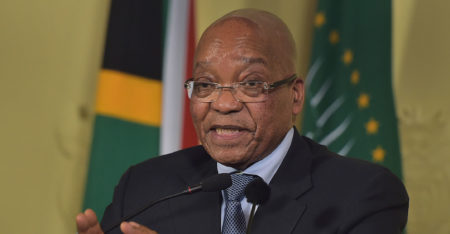
South Africa’s cabinet has asked President Jacob Zuma to set up a judicial review to consider creating a state bank as well as the mandates of both the Banking Tribunal and Banking Ombudsman after the nation’s four biggest lenders said they would stop doing business with a family that has ties to the country’s leader.
Cabinet’s recommendation follows an investigation by an inter-ministerial committee, set up in April, into claims that lenders “acted unilaterally and allegedly in collusion” when they ended relationships with companies controlled by the Gupta family’s Oakbay Investments, mineral resources minister Mosebenzi Zwane, who led the body, said in a statement on his ministry’s website.
Evidence shows the banks’ actions “were as a result of innuendo and potentially reckless media statements and, as a South African company, Oakbay had very little recourse to the law,” the cabinet said. “Looking into these mandates and strengthening them would go a long way in ensuring that, should any other South African company find itself in a similar situation, it could enjoy equal protection of the law.”
First National Bank, Standard Bank and Nedbank said in April that they would shut accounts related to Gupta companies. The family’s members are accused by critics of using their friendship with Zuma to exert influence over political appointments. Oakbay Investments CEO Nazeem Howa has said the steps are unfair and unprecedented, and threaten 7 500 jobs at its mining and media units.
State bank
The cabinet recommends starting a state bank, with the possible corporatisation of the Post Bank as an option.
“All of South Africa’s economic power vests in the hands of very specific institutions, institutions who have shown that their ability to act unilaterally is within their mandate and is protected,” it said. “These institutions are owned by private shareholders and report to national treasury who in turn do not need to act on information provided to it.”
The cabinet wants the nation’s clearing-bank provisions reconsidered to allow for the issuance of new banking licences, it said.
A handful of clearing institutions control the South African banking system, “which ensured that every other local or international bank participating in the South African banking sector would need to go through these clearing banks in order to have their transactions cleared, thereby creating an oligopoly”, it said.
“It is unclear why the Reserve Bank will not issue new banking licences to other banks and this would need to be given careful attention by the judicial inquiry.”
The Gupta family’s businesses employ about 7 500 people in the country. The family made the surprise announcement on 27 August that they will exit all their interests in South Africa by the end of the year.
No participation
Zuma, who has described the Guptas as friends while denying claims that they wield political influence, is facing a public backlash over a police investigation into finance minister Pravin Gordhan, who oversees the treasury, which is probing a Gupta-related company’s coal contracts with a state utility. Zuma’s son Duduzane is in business with them and one of his wives has worked for them.
Gordhan was a member of the ministerial committee, but didn’t participate in its meetings, Zwane said in the statement.
Zwane has been criticised by opposition politicians who have said he told Glencore CEO Ivan Glasenberg to sell the loss-making Optimum coal mine to Tegeta Exploration & Resources, a company in which the Guptas have an interest. Tegeta says the minister had no influence over the deal and wasn’t involved in negotiations. — (c) 2016 Bloomberg LP




